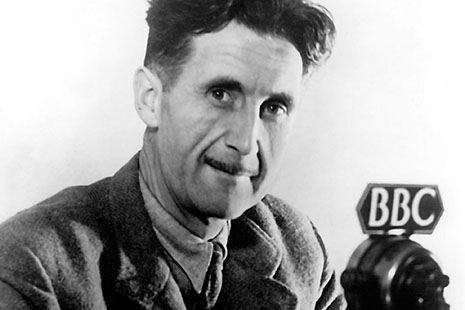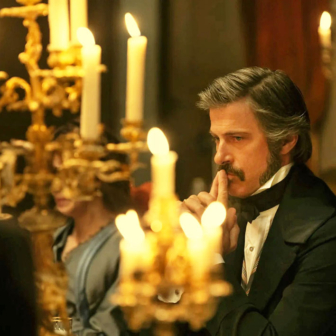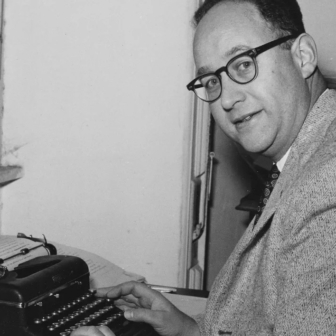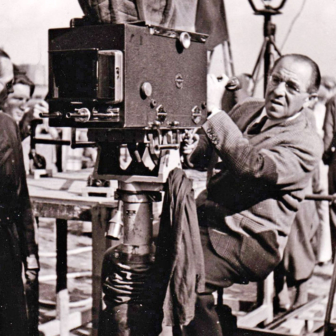THERE ARE no doubt many thousands of people who know that Oliver Twist famously said, “Please sir, I want some more.” Some books, some plays, just enter the collective consciousness without necessarily being read by those who make reference to them. Think of all those who can intone “To be or not to be – that is the question” without having come within a bull’s roar of Hamlet. How many people have nodded sagely at the idea that “Big Brother is watching” without having read its origin in George Orwell’s Nineteen Eighty-Four – even before the moronic television “reality show” (an oxymoron if ever there was one)?
In a perhaps not widely seen British film called Bedrooms and Hallways (1999), an outrageously camp character is warned that he will be in danger from “the fashion police.” Such a warning almost certainly echoes Orwell’s concept of “Thought Police,” those insidious beings who penetrate our instinctive responses, while his crucial term, “Newspeak,” the official language of Oceania, the setting for Nineteen Eighty-Four, has given rise to any number of parallel structures. I haven’t actually heard anyone yet refer to “Ruddspeak” but Google tells me it’s already almost a commonplace.
All this seeming irrelevance is by way of saying that Orwell’s novel, published sixty years ago in an international climate at once very different from our own and in some ways alarmingly recognisable, continues to make its presence felt in our language and in our lives. Arguably, its influence has been even more persistent in the sorts of ways suggested than such other dystopian works as Aldous Huxley’s Brave New World or Anthony Burgess’s The Clockwork Orange. As a political satire, it also has generic affiliations with science-fiction, and like the most memorable of the latter – think of a comparatively recent example, such as Philip K. Dick’s Do Androids Dream of Electric Sheep, filmed as Blade Runner – it is sufficiently anchored in realities we are familiar with for us not to find the whole thing inaccessible.
Like Dick’s story, Nineteen Eighty-Four offers a predictive view of a grim future not so far removed from our own time as to be deeply disturbing. I was in England in 1984 and the cultural commentators, and the hacks, made much of how closely Mrs Thatcher’s England had come to resemble Orwell’s, tossing off many an ill-considered cynicism on the matter. No admirer of the lady’s policies, I’d nevertheless have to say that I think most of these pundits were talking arrant rubbish. No one was trying to interfere with our thought processes – except of course in the ways we all so readily collude with, via newspapers and television for instance – and no one was forcing us to forget the past as if it had never been. And so on. Nevertheless, it remains a very frightening book today, with its warnings about not taking freedoms for granted, with its massaging of statistics, and with the central notion of the rewriting of history to support the incumbent power. Details such as data retrieval processes and the “speakwrite” recording of information, now no longer fantastic in our computer-dominated lives, underpin convincingly Orwell’s dystopian view of London in the aftermath of the second world war.
The novel is a more ambitious political satire than his earlier fable, Animal Farm, which is more perfectly achieved perhaps because it attempts less. Nineteen Eighty-Four is structured in three parts: the first establishes the bleak world of Big Brother, of Newspeak, of the working-life of the protagonist Winston (a name for 1949?); Part II focuses more on his personal life, including his furtive affair with Julia, who, like him, seems to be in opposition to the ruling powers; and Part III resonates horrifically with betrayals at every level, the personal now seen as no protection against the irrefragable – and irrefrangible – edicts and powers of the state as invested in “the Party.”
Orwell’s triumph in this novel is in the creation of a wholly imagined world. By this, I don’t mean a world wholly fantastic, but one in which he gives the impression of having fully imagined it in its underlying concepts, in its structures, and in its quotidian minutiae. It is a world based on the ideal of total control over human thought and action, with the truth offering no sort of protection, even if it could be established. The world has been divided into three mega-states: Oceania, Eastasia and Eurasia, and the powers of Oceania are constantly at war with one of the other two – which one being determined by the Party. The social and political machinery is hierarchically structured, with the Inner Party at the top, living in conditions of comparative ease, the Outer Party, whose functionaries carry out the dictates issued from above, and the vast unnamed horde of “proles” (I wondered if this term was originally an Orwellian abbreviation). At various early points in the narrative, one wonders if the proles are meant to be viewed as the hope of the side. In 1949, within a few years of the dismissal of the Churchill government in favour of Attlee’s Labour regime and the introduction of the Welfare State, it may just have looked as if the spirit enshrined in Orwell’s singing washerwoman offered a hope for the future.
But Orwell doesn’t offer any such obvious positives, however optimistically we may be programmed to look for them. Briefly, in Part II, we wonder if the reciprocated emotion and sensuality that passes between Winston and Julia might be the answer. Love conquers all, as writers at least from Chaucer on have encouraged us to believe, but the two who have felt themselves safe – or as safe as you could be in this world – in the upper room of antique dealer Charrington’s premises are betrayed by their apparent benefactor and will in turn, in sheer unbearable pain, betray each other. So, love is no guarantee of anything. The Party indeed is working to eradicate emotion and sex and family.
When, in Part III, Winston is being tortured by O’Brien, whom he has regarded as a member of the anti-Party resistance, all he can offer is: “I know that you will fail. There is something in the universe – I don’t know, some spirit, some principle – that you will never overcome.” Pressed by O’Brien to be more specific, he can only add, “I don’t know. The spirit of Man.” But Orwell’s novel moves towards no such bromide. The novel’s last sentence is “He loved Big Brother.” Winston has been “cured” of outmoded consolations and accepted the only one that enables him to get on with sousing himself in Victory Gin.
What does “the Party” stand for? Remembering that Orwell was writing in 1949, we can equate its manipulations with either Nazi Germany or Stalinist Russia. Orwell, a committed socialist, was opposed to totalitarian regimes of both the right and the left, finding little to choose between them. Each in its way thrived on distortion: both vilified those who thought otherwise; neither could cope with individuality; both needed to represent the past in ways that served the interests of the present in which they sought unquestioning submission to their dominant ideologies. Orwell was writing in a climate of Cold War suspicions, but, lest we think of the Party as referring only to those totalitarian extremes, it is also worth remembering that in the so-called democracy of the United States there existed a monster called HUAC (the House Un-American Activities Committee).
As playwright Arthur Miller, on whom HUAC had long fastened its insidious attentions, wrote of it in the introduction to his Collected Plays (1958), “It was as though the whole country had been born anew, without a memory even of certain elemental decencies which a year or two earlier no one would have imagined could be altered, let alone forgotten.” He was struck with “the mystery of the handing over of conscience which seemed to me to be the central and informing fact of the time.” I’ve no idea how familiar Miller was with Orwell’s book by the time of writing these sentences, but his outrage at the idea of history’s being rewritten to give a different sense of the past and at the state control of individual perception and belief suggests at least a fellow-feeling.
THE WEAKNESS of Nineteen Eighty-Four as a novel is in the slabs of the reputedly rebellious Goldstein’s treatise, “The Theory and Practice of Oligarchical Collectivism,” which seems to be offering a critique of the way the Party functions. It explains how this society operates in matters such as the aims of modern warfare (“to use up the products of the machine without raising the general standard of living”), or its use of “doublethink” (another Orwellian term that has passed into the language) “as the power of holding two contradictory beliefs in one’s mind simultaneously, and accepting them both,” or how Big Brother works as “the guise in which the Party chooses to exhibit itself to the world.” And so on, for many pages, some of which Winston reads aloud to Julia when they are in bed. (Unsurprisingly, she falls asleep.) It is not that this discourse is other than closely argued in its subtly satirical mode; rather, it disrupts the narrative momentum and its purposes are too nearly didactic as distinct from the rest of the book where ideas are dramatised through character and action.
A recent novel which audaciously and more successfully interrupts its narrative sequence without loss of momentum is J.M. Coetzee’s Elizabeth Costello (2003), in which the titular author goes about the world giving lectures and conducting seminars, the material of which takes up the bulk of the book. Here, though, Costello is characterised in these lectures and they dramatise her changing and sometimes querulous attitudes. In Nineteen Eighty-Four, Goldstein’s book looks suspiciously like an authorial intervention in case we haven’t fully grasped what the Party is up to in Oceania.
It was inevitable that someone would film the book when its eponymous year came round. Prior to this, there had been two film versions, the more highly regarded of which was Rudolph Cartier’s 1954 television adaptation. Originally transmitted live on a Sunday evening, it was found to be so shocking that there were complaints to the BBC and attempts to suppress a repeat performance. Leslie Halliwell records that a telerecording was shown at the National Film Theatre, London in early 1984, to a youthful audience, which was “stunned… into silence and then into an ovation.” Sadly, this notable production (starring Hammer’s Dr Frankenstein, Peter Cushing, and Yvonne Mitchell) became unavailable when the producers of the 1984 film bought the rights. As Halliwell continued, “In Orwellian language, one of TV’s great landmarks now unexisted.” Also long unavailable was the 1956 production by Associated-British, featuring American stars, Edmond O’Brien and Jan Sterling, in the hope no doubt of US distribution, and Michael Redgrave as the treacherous O’Connor. The latter’s name has been changed from O’Brien in the book: could the filmmakers have feared it might reflect badly on their imported Winston? One reviewer reflecting on the film’s literal-minded rendering of the novel’s drab and nightmarish qualities claimed that it “often merely depresses instead of shocking and horrifying.”
The adaptation currently available on DVD is Michael Radford’s, filmed, as it claims in the final credits, in “April–June 1984 – the exact time imagined by Orwell.” Wearing its fidelity credentials thus on its sleeve, as if under the eye of Big Brother himself, the film is intelligent enough without ever being really exciting. Filmed largely in desaturated colour, contrasted intermittently with images of a green landscape which is a figment of Winston’s troubled imagination, it creates an adequate sense of a society under the heel of a bureaucratic tyranny. There are shots of undifferentiated crowds listening to inflammatory broadcasts on the omnipresent telescreens, and Big Brother’s face in featureless sepia dominates these screens and posters. Radford has chosen to highlight the “love story” between Winston and Julia, and in the latter’s case to take advantage of relaxed censorship to present her nude, and it could be argued that this emphasis on the sensuality of the love affair intensifies the horror of their final betrayals of each other – and of the final image of Winston as a broken man downing Victory Gin in the Chestnut Café.
What is missing, though, is a potent sense of the political thinking behind the kinds of nightmare the film does present. Rats in a cage are one thing, but there’s not much feeling for the kind of thought, and thought-suppression, that are part of Winston’s constrained world. John Hurt’s painfully furrowed look and emaciated body provide a convincing incarnation of a man caught in a system he hates, and Richard Burton has a compelling gravitas as the duplicitous O’Brien, suave, comforting and dangerous. But perhaps the most resonant image is that of playwright Pam Gems as the singing washerwoman. There is something fleetingly substantial about her that is missing elsewhere.
I’m not certain where Orwell stands today. Animal Farm surely retains its status as a tight, dark and witty fable; Homage to Catalonia still seems a powerful history of a crucial twentieth century conflict; his essays on a wide range of topics all testify to an immaculate stylist exercising a chaste control over the language. I mentioned Coetzee earlier: in respect of style, he often seems like a successor to Orwell. As for Nineteen Eighty-Four itself, well, you can say it hasn’t happened yet, but it has enough threads of prescience to keep us alert. Power as an end in itself is still perhaps about as frightening as it gets. •




